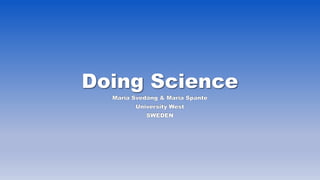
Doing science
- 5. About water
- 8. Field of study Group 1 Saltwater Group 2 Acid water Group 3 Osmosis Group 4 The sea Group 5 Water in human beings Group 6 Properties of water Group 7 The water cycle Chosen experiment Melting of ice with/without salt Investigation of acidity in different soil samples Osmosis through film from egg Stratification of warm and cold water Drinking water standing upside-down Experiment with surface tension Boiling saltwater and condensing the water vapor
- 9. Drinking water upside-down Surface tension Stratification http://8cgnublogg.blogspot.se/
- 12. ”It has been fun – because it has not been like ordinary lessons” ”Fun to try something new….” ”It has worked out well – but difficult to communicate…”
- 15. 0 1 2 3 4 5 6 7 POSITIVE COMMENTS NEGATIVE COMMENTS EXPERIENCED LEARNING IMPROVEMENT PROPOSALS Communication/language Technical support Project planning The work wit the laboratory task
Notas del editor
- Mr Chairman, Ladies and Gentlemen,I am very happy to be here today…My name is Maria Svedäng
- I work at the teacher training program at University West, in the City of Trollhättan, a city famous for its waterfalls and for the two ancient, still operational, hydropower stations situated more or less in the middle of the town.
- Today I am going to talk about the GNU-project – a joint education project studying the use of information and communication techniques in teaching and learning, involving junior high schools in Sweden, Denmark and Norway.The GNU-project started in late 2012 and extends to 2014. The aim of the project is to develop cross-border teaching and learning experiences using different ICT:s. A basic idea in the project is that the teaching and learning sessions that take place in the project should be user-driven and co-designed between participating teachers in the schools and the researchers
- Another key stone in the project is the cross-border communication – between students in the different schools participating in the project, between teachers from different countries and between the researchers from the different countries. The communication is mediated through different ICT:s – both synchronously, as for instance Skype, and asynchronously in shared documents, blogs etcetera….
- The GNU-project consists of a number of subject groups working with different subject content such as mathematics, history and language. My part in the project is in the Science group and me and my colleague Maria Spante work together with the Science teacher in a Swedish school, two teachers in a Danish school and researchers from Denmark and NorwayThe cross-border student activities in the Science-group were co-planned by the teachers in the participating classes and the researchers. We wanted the assignment for the students to be open, and as far as possible driven by the students. They were challenged to search for interesting and simple experiments online – experiments that in illustrate the properties of water in some way….
- The students were divided in seven cross-border groups with three to four students from each country. Each group was assigned a field of study of their own to investigate - such as for instance water in the human body, water in the sea, physical properties of water etc…. This is a screen-dump of the class-blog where the Swedish students presented themselves and their school initially to the Danish students.
- The films were shared on the mutual blog and the experiments were reported and discussed in shared documents
- The groups then searched the web for simple experiments illustrating some properties of water, and discussed their findings with their fellow students in Denmark. Together they decided which experiment to do, and the experimental set-up was planned online in shared documents. After planning the experimental set-up the students performed their chosen experiment and video-taped the process with the cameras in their computers.
- It is interesting to follow the students work with the experiments - online and in the films – it is clear that they are aware of the fact that they carry out the experiments for someone else who is going to watch the film. They show all their material used very rigorous, point at important processes and happenings and wave at the camera to greet their fellow students in Denmark.
- When studying the students work with the search online for experiments, their discussions with the Danish students and their execution and sharing of the experiments via shared documents and films, it is obvious that they have reached the goals of “doing” – that is they have managed to perform the experiments successfully and to record and communicate what they are doing using the ICT:s provided. When studying the students reports on the experiments it is not equally obvious that the doing part of the experiments has resulted in scientific learning. The students use some scientific concepts and draw some scientific conclusions, but in some cases the concepts are used incorrectly, and in some cases the students reasoning reveals that they have not understood what the experiment they have performed really demonstrate….Thus – the students in this study showed skills in the “doing-part” of the task – they managed to plan and do everything requested successfully. On the other hand it is obvious that they did not understand everything they did, and they would absolutely have benefited from a more profound discussion about the phenomenon studied, and of more support from their teacher in interpreting their data
- On the third hand, the students really enjoyed working in this autonomous, unusual way – and although they encountered many technical and communicational problems, they always were very happy to work in the project, enjoyed meeting their Danish friends online and really tried to do their best
- So – our conclusion is that although the deep scientific learning might have been insufficient, the students had the opportunity to train and develop important skills such as working self-dependent, cooperating, communicating using different ICT:s, planning the set-up of an experiment etcetera….